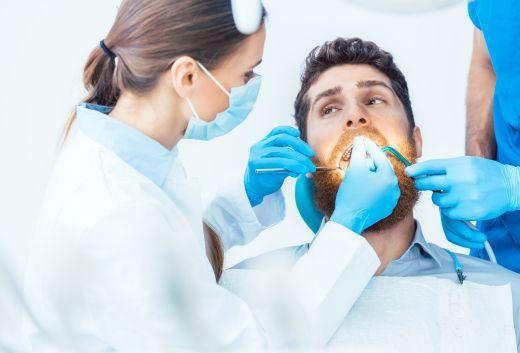
Many people use the terms "oral surgeon" and "dentist" interchangeably. While both provide oral care, there are important differences in their training and expertise.
Understanding those differences can help you determine when you need specialized care.
Who is an Oral Surgeon?
An oral surgeon is a dentist who has completed 4-6 years of additional surgical training beyond dental school. They specialize in complex procedures such as:
- Wisdom tooth extractions
- Dental implants
- Corrective jaw surgery
- TMJ surgery
- Pathology and biopsies
Oral surgeons can provide both surgical and other dental care. Their advanced expertise comes in handy for complicated oral surgery and medical cases.
What Procedures Require an Oral Surgeon?
Many procedures should only be performed by a trained oral surgeon rather than a general dentist. These include:
- Wisdom Tooth Extractions
Wisdom teeth often become impacted or come in at difficult angles. Their extraction requires cutting into bone and removing teeth fragments. Sedation is usually needed to keep patients comfortable and safe.
- Dental Implant Placement
Dental implants involve surgery to anchor artificial teeth to the jaw bone. Proper placement requires thoroughly assessing bone structure, carefully removing any remains of the natural tooth root, and positioning implants with precision.
- Corrective Jaw Surgery
Surgeries such as orthognathic surgery to realign the jaw require an expert level of surgical skill and planning.
- Biopsies for Oral Pathology
Oral surgeons have the expertise to perform biopsies of abnormal growths or lesions within the mouth and interpret pathology reports.
When to Choose an Oral Surgeon over a Dentist
For most cleanings, fillings, and routine care, a general dentist is fully qualified to meet your needs. However, you should be referred to an oral surgeon if your case presents any complex medical factors, sedation needs for anxiety, the risk of complications, or requires expert-level surgical skill.
Locating an Oral Surgeon
Your general dentist can provide referrals to trusted oral surgeons in your area. You can also search provider databases from professional organizations like the American Association of Oral and Maxillofacial Surgeons. If you have dental insurance, check their listings for in-network oral surgeons.
Consultations Are Key
Schedule an initial consultation before any procedure. During this, you can discuss your medical and dental history, goals for surgery, and any questions. A quality oral surgeon will explain options clearly and address all of your concerns. These consults help establish trust and aligned expectations.
The Takeaway
Oral surgeons and general dentists have a complementary relationship. While a general dentist can meet many oral health needs, oral surgeons have advanced training for complex surgical procedures.
Their specialized expertise makes them an important healthcare resource for specific situations.
